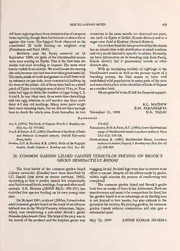
Common garden lizard Calotes versicolor preying on Brook's gecko Hemidactylus brooki PDF
Preview Common garden lizard Calotes versicolor preying on Brook's gecko Hemidactylus brooki
MISCELLANEOUSNOTES 459 Allthesesightingshavebeen interpretedas ofescapees occasions in the same month, we observed two pairs, fromcaptivity,thoughtherehasbeenno evidenceforor one each on Typha at Dethli (Klieda district) and in a against this view. The biggest flock observed so far sugar-cane field at Kodinar (Amreli district). constituted 20 birds feeding on sorghum crop Itisevidentfromthedatapresentedthatthemunia (Parasharya and Patel 1985). has an almost state wide distribution in small numbers Recently near the Pariej reservoir on 13 and very much limited to specific localities. Presently, September 1989, six pairs of the blackheaded munia we have information on its breeding only from Pariej, were seen nesting on Typha. This is the first time the Kheda district, but it presumably breeds in other munia was seen breeding in Gujarat. The nests were districts also. barelyvisiblefromoutside.Wecouldlocatethenesting With an increasing number of sightings of the siteonlybecauseonebirdwasseentakingnestmaterial. blackheaded munia as well as the present report of a Thenests,made ofreedsand grasses inaball formwith breeding colony, the bird seems to have well an entrance on one side, were constructed halfway up established wild populations in many parts ofthe state the stem ofthe plants. All ofthemwere built in a small andmust findaplace inthechecklistofbirds ofGujarat patch ofTypha coveringan area ofabout 15 sq.m.Four as a residentbird. nests had eggs in them, the number ofeggs being 2, 3, We are grateful totheICAR forfinancial support. 4 and 6. In one other nest, there were three hatchlings and one egg, whereas in still another one there were three 4-5 day old nestlings. Many more pairs might K.L. MATHEW have been breeding there, but we did not have enough BM. PARASHARYA time to check the whole area. Soon thereafter, on two November 21, 1989 D.N. YADAV References An, S. (1954): The birds ofGujarat, Part II.J. Bombay nat 575-612. HistSoc.52:735-802. Parasharya,B.M.&Patel,R.C.(1985) Anewdistributional : Au, S. &Ripley,S.D. (1983): HandbookoftheBirdsofIndia range ofblackheaded muniaLonchura malacca.Pavo and Pakistan (Compact edition). Oxford University 23(1&2):105-106. Press,Delhi. Siuvrajkumar, K. (1985): Blackheaded Munia, Lonchura Monga, S.G. & Naoroji, R.K. (1983): Birds ofthe Rajpipla malaccainJasdan,Gujarat.J.BombaynatHist.Soc.82 forests, South Gujarat J. Bombay nat. Hist Soc. 80: (1):298-309. COMMON GARDEN LIZARD CALOTES VERSICOLOR PREYING ON BROOK’S 28. GECKO HEMIDACTYLUS BROOKI The food habits of the common garden lizard wagging itstail. Itshind legswere also in motion in an Calotes versicolor (Daudin) have been described by effort to escape. Despite all the efforts madeby gecko, J.C. Daniel (the book of Indian reptiles, 1983). within eight minutes the process of swallowing was According to him it prefers insects but occasionally completed. mayfeedonsmallbirds,nestlings,frogsandothersmall The common garden lizard and Brook’s gecko animals. S.K. Sharma JBNHS 88(2): 290-291) has both live on trunks oftrees in the Arboretum. Both are ( recorded this species feeding on its own young ones insectivorous and seemto be competitors for food, but also. the garden lizard is at an advantage as-its feeding area On26April 1991,atabout 1200hrs,Iobservedan is not limited to tree trunks, but also extends to the adult common gardenlizard onthe trunkofanAlbizzia ground inthevicinity.By preyinggeckos,the common lebbeck tree in the World Forestry Arboretum, Jaipur, garden lizards reduces competition and also gets a which was swallowing a sub-adult Brook’s gecko substantial meal. Hemidactylusbrooki Gray. Thehead ofthe prey was in the mouth of the predator and the helpless gecko was May 23, 1989 SATISH KUMAR SHARMA
